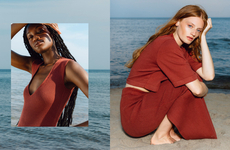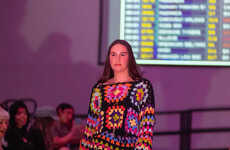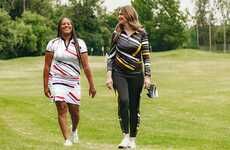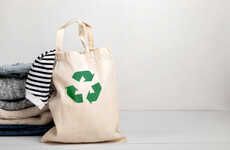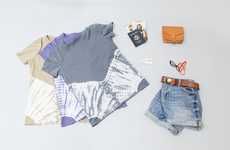
People- and Profit-Driven Brands
Tiana Reid — May 1, 2012 — Social Good
References: fashioningchange
Adriana Herrera is the Founder and CEO of Fashioning Change, an online fashion boutique where you can find people- and planet-friendly alternatives to the brands you love.
The website is hyper-interactive (There's even a chat!), easy to use and has an extensive offering. It's for these reasons and more that Adriana Herrera's social business has been featured in TechCrunch, Fox News, Mashable, Ecouterre, and of course, Trend Hunter's SocialBusiness.org.
Here, Herrara shares her story, from cradle-to-cradle design to manufacturing and even huge homemade meals for her family and friends.
Four Questions with Adriana Herrera
1. How did the idea for the business model come about?
My father is from Juarez, Mexico, a city that many consumer goods companies outsource to. He had friends and family that worked in many of the factories and knew what it meant for the people and the community to purchase one brand over the other. As a result, I ended up with three very unique rules by which I had to make purchases growing up: [1] I wasn't allowed to buy things made in Asia, [2] I wasn't allowed to buy clothing made of synthetic materials, and [3] I wasn't allowed to buy clothing with dark colors because my dad feels that children are the light of the world and shouldn't wear dark colors. As a result, I grew up with a unique lens on making purchases... I was always thinking about where something came from, how it was made, who it was made by, and under what conditions.
Fast forward several years and I ended up co-founding a product development company and domestically manufacturing eco-friendly and ethical handbags. It was through that process that I met designers that shared my passion for cradle-to-cradle design and socially responsible manufacturing. What I noticed is that while they could make beautiful garments and accessories, they were forgetting about one major element of business: reaching the consumers. Recognizing this missing link, I brainstormed about how we could leverage information on the brands shoppers know they like and want, to introduce them to comparative stylish independent brands that were sustainably and ethically designed.
The core tenet of our business model is to "use what exists," meaning we don't try and change shopping behavior but instead, we work to help shoppers adopt better purchasing habits by using personal preferences to introduce them to products that are free of toxins, earth-friendly and promote happiness for all people.
2. How did you decide to join this sector?
Creating a for-good/socially responsible business was easy. The ideological principals were basically in my DNA. The decision to enter the tech sector was an unexpected one. Once I realized there was a large disconnect between consumers that want to make socially responsible purchases, and the brands that had offerings for them, I wanted to create a scalable solution that would allow shoppers to find healthy, Earth-friendly, and people friendly alternatives to anything they put in and on their bodies, in their homes and in their communities. As a result, I merged my upbringing, education in psychology, experience manufacturing cradle-to-cradle products, and dove head first into the world of tech (at our core, Fashioning Change is a retail tech platform).
I didn't know anything about the world of tech and startups so I entered the Founders Institute, a tech accelerator. After being the only woman to go through the program, I taught myself to code and began to recruit a team. From there, all the pieces started to fall into place. :)
3. How do you get your inspiration?
I have a holistic view on the world. As a little girl I was also raised to question everything. Consequently, much of our business model inspiration comes from the meshing together of principals from a wide array of disciplines as well as my aggregation of conversations from people from all walks of life. My personal inspiration comes from the people I love and my friends. The fire that drives me to put my heart and soul into Fashioning Change is the social injustice that results from a culture of flash and trash consumerism and the impact it has on people and the Earth.
4. How do you reset yourself to be creative? Do you have any rituals?
I am able to reset and refresh my creativity through cooking. I love to cook. Being able to make tasty, healthy meals that my friends and family can enjoy brings me so much happiness. Cooking also has a very definitive start and end... which is great for me because sometimes I won't see the light at the end of the tunnel of a project for weeks. Every weekend I try to prepare huge meals for friends and family -- it's therapeutic and gives me an outlet to play and enjoy the company of other inspiring souls.
The website is hyper-interactive (There's even a chat!), easy to use and has an extensive offering. It's for these reasons and more that Adriana Herrera's social business has been featured in TechCrunch, Fox News, Mashable, Ecouterre, and of course, Trend Hunter's SocialBusiness.org.
Here, Herrara shares her story, from cradle-to-cradle design to manufacturing and even huge homemade meals for her family and friends.
Four Questions with Adriana Herrera
1. How did the idea for the business model come about?
My father is from Juarez, Mexico, a city that many consumer goods companies outsource to. He had friends and family that worked in many of the factories and knew what it meant for the people and the community to purchase one brand over the other. As a result, I ended up with three very unique rules by which I had to make purchases growing up: [1] I wasn't allowed to buy things made in Asia, [2] I wasn't allowed to buy clothing made of synthetic materials, and [3] I wasn't allowed to buy clothing with dark colors because my dad feels that children are the light of the world and shouldn't wear dark colors. As a result, I grew up with a unique lens on making purchases... I was always thinking about where something came from, how it was made, who it was made by, and under what conditions.
Fast forward several years and I ended up co-founding a product development company and domestically manufacturing eco-friendly and ethical handbags. It was through that process that I met designers that shared my passion for cradle-to-cradle design and socially responsible manufacturing. What I noticed is that while they could make beautiful garments and accessories, they were forgetting about one major element of business: reaching the consumers. Recognizing this missing link, I brainstormed about how we could leverage information on the brands shoppers know they like and want, to introduce them to comparative stylish independent brands that were sustainably and ethically designed.
The core tenet of our business model is to "use what exists," meaning we don't try and change shopping behavior but instead, we work to help shoppers adopt better purchasing habits by using personal preferences to introduce them to products that are free of toxins, earth-friendly and promote happiness for all people.
2. How did you decide to join this sector?
Creating a for-good/socially responsible business was easy. The ideological principals were basically in my DNA. The decision to enter the tech sector was an unexpected one. Once I realized there was a large disconnect between consumers that want to make socially responsible purchases, and the brands that had offerings for them, I wanted to create a scalable solution that would allow shoppers to find healthy, Earth-friendly, and people friendly alternatives to anything they put in and on their bodies, in their homes and in their communities. As a result, I merged my upbringing, education in psychology, experience manufacturing cradle-to-cradle products, and dove head first into the world of tech (at our core, Fashioning Change is a retail tech platform).
I didn't know anything about the world of tech and startups so I entered the Founders Institute, a tech accelerator. After being the only woman to go through the program, I taught myself to code and began to recruit a team. From there, all the pieces started to fall into place. :)
3. How do you get your inspiration?
I have a holistic view on the world. As a little girl I was also raised to question everything. Consequently, much of our business model inspiration comes from the meshing together of principals from a wide array of disciplines as well as my aggregation of conversations from people from all walks of life. My personal inspiration comes from the people I love and my friends. The fire that drives me to put my heart and soul into Fashioning Change is the social injustice that results from a culture of flash and trash consumerism and the impact it has on people and the Earth.
4. How do you reset yourself to be creative? Do you have any rituals?
I am able to reset and refresh my creativity through cooking. I love to cook. Being able to make tasty, healthy meals that my friends and family can enjoy brings me so much happiness. Cooking also has a very definitive start and end... which is great for me because sometimes I won't see the light at the end of the tunnel of a project for weeks. Every weekend I try to prepare huge meals for friends and family -- it's therapeutic and gives me an outlet to play and enjoy the company of other inspiring souls.
Trend Themes
1. Sustainable Fashion - Disruptive innovation opportunity: Develop technology solutions to connect consumers with sustainable and ethical fashion brands.
2. Socially Responsible Purchasing - Disruptive innovation opportunity: Create platforms that leverage personal preferences to introduce consumers to socially responsible products.
3. Tech-enabled Retail - Disruptive innovation opportunity: Build scalable retail tech platforms that enable consumers to find healthy and eco-friendly alternatives to mainstream brands.
Industry Implications
1. Fashion - Disruptive innovation opportunity: Integrate sustainability and ethical practices into the fashion industry.
2. E-commerce - Disruptive innovation opportunity: Develop e-commerce platforms that prioritize offering socially responsible products.
3. Tech Startups - Disruptive innovation opportunity: Support the growth of tech startups focused on sustainable and socially responsible solutions.
4.9
Score
Popularity
Activity
Freshness




